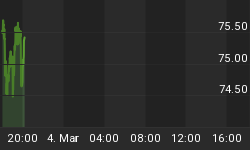Gold Bounces as Euro Hits 2009 High, But "No Strong Investment" Despite US Hyper-Inflation Fears
THE PRICE OF WHOLESALE GOLD bounced in London on Tuesday morning, reaching $983 an ounce for Dollar investors and recovering from near 5-week lows versus the British Pound.
The Gold Price in Euros held steady at €689 as the single currency also leapt, jumping to new 2009 highs against the Dollar above $1.4270.
"Upside for gold could be limited today," reckons Walter de Wet at Standard Bank in a note. "There were fairly large volumes of physical gold selling [on Monday] when the price moved above $980."
But with US Treasury bond prices down more than 5% for the year to date, and "while higher yields increase the cost of holding gold in the longer run," de Wet adds, "right now it signals reduced investment appetite for exposure to the US and a weaker Dollar."
"Don't be complacent and think there isn't any alternative for China to buy your bills and bonds," warned former central-bank advisor Yu Yongding - scheduled to meet US Treasury secretary Tim Geithner in Beijing today - in an interview on Monday.
"The Euro is an alternative. And there are lots of raw materials we can still buy."
According to data from Bloomberg , foreign investment in US Treasury debt rose nearly $69 billion in May, with strong foreign demand for last week's auction of $101bn in new bonds.
The Federal Reserve will continue its $300bn "quantitative easing" of longer-term interest rates by purchasing 10- and 2-year bonds in the open market tomorrow and Thursday.
"Most of the ongoing rally in the precious metal is more driven by a stark weakness in the US Dollar than the risk averse buying we saw last winter," agrees Andrey Kryuchenkov at VTB Capital in London, quoted by The Telegraph.
"Inflation concerns are gradually creeping onto the investor agenda."
Gold Investment continues "to track moves in the Dollar, the key factor driving gold," said Pradeep Unni at Richcomm Global Services in Dubai, in a note today, quoted by Bloomberg.
The negative correlation between Gold and the US Dollar - meaning that gold rises as the Dollar falls - has returned "as optimism grows that the worst of the economic downturn is over."
Monday showed US Personal Incomes rising sharply in April, but only due to tax cuts and stimulus government spending. Wages and salaries were flat.
New data this morning said unemployment in the 16-nation Eurozone rising to 9.2%, while growth in the UK's broad money supply slowed from 18.2% year-on-year to 17.4%.
The FTSE100 index here in London dropped 0.5% from Monday's 5-month closing high. Germany's Dax held near its best level since late November. UK gilts and German bunds both rose as equities drifted, pushing 10-year German yields back down to 3.65%.
Switzerland meantime reported a 2.4% drop in its GDP from a year earlier for Jan. to April '09 - during which the Swiss Franc dropped almost 10% of its value vs. the Dollar.
Since the Swiss National Bank (SNB) then announced "quantitative easing" to sell Francs and depress their value on March 15th, the currency has regained all those losses.
Today the Gold Price in Swiss Francs held near CHF 1,040 per ounce - some 12% off its record top of late Feb.
"We are seeing no strong physical Gold Investment and we hold our one-month forecast for gold at $950 an ounce," says UBS chief metals strategist John Reade in London.
Yesterday the New York SPDR Gold ETF added another 15 tonnes to the hoard backing its shares, taking the total to a new record above 1,134 tonnes with the first rise in 6 sessions and only the third rise since Jan-to-April saw the trust swell by 44%.
But "One day of decent flows is not enough to change our minds on the near-term outlook for gold," says Reade.
Each share in the SPDR trust fund - nominally equal to one-tenth of an ounce - is now backed by 9.82% of an ounce.
"There's a lot of concern about inflation, even talk about hyper-inflation down the road," said Christoffer Moltke-Leth at Saxo Capital Markets in Singapore to the AP earlier.
"Oil right now is a freight train barreling upward."
US crude prices slipped 0.8% early Tuesday, but held above $68 per barrel, its best level since November. Copper also retreated from 7-month highs as "People question the speed of the recovery," according to Alex Heath at RBC Capital in London, speaking to Bloomberg.
"I am sure that the US will go into hyperinflation," said Marc Faber, publisher of the Gloom, Boom & Doom report, in an interview with the newswire last week.
"The problem with government debt growing so much is that when the time will come and the Fed should increase interest rates, they will be very reluctant to do so and so inflation will start to accelerate."
Analysis by USA Today says federal liabilities - including Medicare and social security - rose 12% last year to equal $546,668 per US household.
Of the record $63.8 trillion in tax-paid obligations, some $11.2 trillion is currently being financed by US Treasury bonds.















